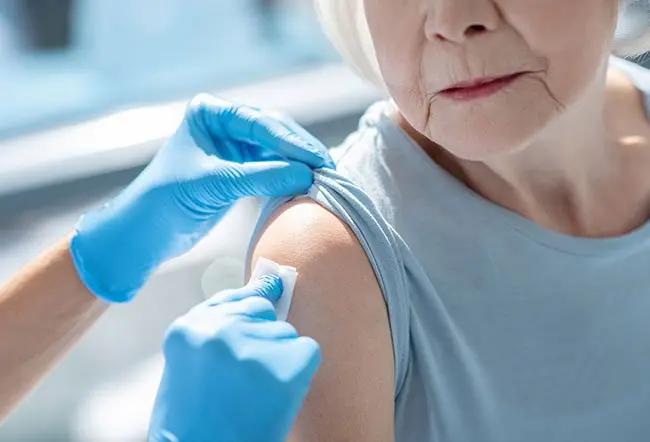- What Is It?
- Who Should Get It?
- Effectiveness
- Side Effects
- Who Should Avoid It?
- Insurance Coverage
-
Comments
-
**COMMENTSTAGLIST**
-
More
-
**OTHERTAGLIST**

The effects of the Shingrix vaccine last for at least four years in most people and may last even longer in some. According to the Centers for Disease Control and Prevention (CDC), you do not need a booster dose after getting the two doses of Shingrix. CDC recommends taking the second dose of Shingrix 2 to 6 months after the first dose.
What is Shingrix?
Shingrix is a new vaccine that has been recently approved by the FDA that protects against shingles (herpes zoster or zoster), a painful rash that appears on one side of the body, head, or face.
If you have had chickenpox in the past, you may get shingles later in life. Chickenpox and shingles are both caused by the same virus (varicella-zoster virus). Once a person recovers from chickenpox, the virus remains inactive in the body and can become active years later, causing shingles.
The Shingrix vaccine also provides protection against potential complications of shingles, which can include:
- Postherpetic neuralgia (PHN): PHN is the most common complication of shingles and affects the skin and nerve fibers, causing pain after the rash subsides.
- Eye complications: Shingles in and around the eye can cause eye infections that may result in:
- Corneal ulcers
- Glaucoma
- Retinal necrosis
- Partial or total vision loss
- Pneumonia: If the virus affects the lungs, it can lead to pneumonia.
- Encephalitis: If the virus affects the brain, it can cause a severe, life-threatening inflammation called encephalitis, which may lead to:
Who is a candidate for the shingles vaccine?

Healthy adults aged 50 years and older are candidates for the shingles vaccine Shingrix. There is no age limit, and you can get the Shingrix vaccine even if you have already had shingles, have had the Zostavax vaccine, or do not remember whether you have had chickenpox in the past.
If you have already had shingles, getting the Shingrix can help protect you from the disease coming back. Studies have reported that almost every American aged 40 years and older have more than a 99% chance of having had chickenpox, and people who have had chickenpox are more likely to develop shingles in the future because both are caused by the same virus—the varicella-zoster virus.
After having shingles, there is no duration that you need to wait before getting vaccinated, although you should wait until the rash has completely disappeared. Shringrix is given in 2 doses 2-6 months apart.

SLIDESHOW
Exercises for Seniors: Tips for Core, Balance, Stretching See SlideshowHow effective is the Shingrix vaccine?
Two doses of Shingrix are more than 90% effective in preventing shingles and PHN. Shingrix is around 85% effective in people over 70 years of age in the first four years after vaccination.
CDC suggests that healthy adults age 50 and older should get two doses of Shingrix, separated by two to six months.
What are the side effects of Shingrix vaccine?
As with most vaccines, Shingrix may have side effects, including:
- Soreness in the arm
- Headache
- Chills
- Fever
- Stomach pain
- Nausea
- Redness
- Swelling
- Tiredness
- Muscle pain
Side effects are usually mild and may last for two to three days. No severe side effects for Shingrix have been reported so far.
Who should avoid getting the Shingrix vaccine?
You should not get Shingrix if you:
- Have ever had a severe allergic reaction to any component of the Shingrix vaccine
- Currently have shingles
- Currently are pregnant or breastfeeding
- Tested negative for immunity to varicella-zoster virus (negative antibodies)
- Have a moderate or severe illness with a temperature of 101.3º F
- Have gotten Varivax (chickenpox vaccine) less than eight weeks ago
Is the shingles vaccine covered by insurance?
The shingles vaccine may be covered by insurance depending upon the insurance program:
- Medicare: Medicare Part D covers shingles vaccine expenses, but it depends on the plan. You may need to pay either in part or full and then get it reimbursed. Medicare part B does not cover the vaccine.
- Medicaid: Medicaid may or may not cover the vaccine. You can find out by contacting your insurer.
- Private health insurance: Most private health insurance programs cover the shingles vaccine, but you may need to pay some part of the expenses depending on your plan.
- Vaccine assistance program: Check with the Shingrix manufacturer, GlaxoSmithKline, if they have a Shingrix vaccine assistance program. Through vaccine assistance programs, people who cannot afford the vaccine can get help in the form of free vaccination.
Health News
Centers for Disease Control and Prevention. Shingles Vaccination. https://www.cdc.gov/vaccines/vpd/shingles/public/shingrix/index.html
Harvard Health Publishing. Should I Get the New Shingles Vaccine? June 2018. https://www.health.harvard.edu/diseases-and-conditions/should-i-get-the-new-shingles-vaccine
Shingles Vaccination: https://www.cdc.gov/vaccines/vpd/shingles/public/shingrix/index.html
Top How Long Does the Shingrix Vaccine Last? Related Articles

Can You Get Shingles After Being Vaccinated?
Shingles is a viral infection. It presents with a rash followed by an episode of intense pain in the infected area. This is caused by the virus called varicella zoster. This virus also causes chickenpox. If a child has had chickenpox, the virus may not completely go away, lie dormant in the body and come back years later as shingles. Older individuals and immunocompromised individuals are more likely to develop shingles.
Can You Have a Mild Case of Shingles?
The severity of shingles depends on various factors, such as age of the patient, general health condition of the patient, and the part of the body where shingles develops.
How Long Does It Take for Someone to Recover From Shingles?
Typically, it takes about 2-5 weeks for someone to recover from shingles, although some cases may take longer. Learn about causes, symptoms, and treatment.
How Long Is Shingles Contagious?
Shingles is contagious from the time the blisters are oozing until the time the blisters have scabbed.
How Much Does a Shingles Shot Usually Cost?
Depending on your medical insurance plan, the full price for two doses of the shingles vaccine could cost around $324 or less.
Is Shingles Contagious?
Shingles is an infection caused by the varicella-zoster virus. Shingles symptoms and signs include skin burning, numbness, and tingling along with a painful red, blistering rash. Shingles is contagious until all of the blisters have crusted over.
Shingles
Shingles, or herpes zoster, is a painful rash caused by the varicella zoster virus. Other shingles symptoms include headache, fever, nausea, and body aches. Treatment focuses on pain management and shortening the duration of the illness with antiviral medications.
Shingles Quiz
Shingles falls within a well-known family of viruses that cause itching, burning, blisters, and pain. Take the Shingles Quiz to get the facts, causes, symptoms, and treatments for this itchy, painful condition.
What Happens When You Get Shingles When Pregnant?
Becoming infected with chickenpox during pregnancy could cause birth defects in your unborn child. Likewise, shingles could also cause problems for your unborn child. If you are pregnant and haven't had chickenpox, avoid exposure to infected people. Zostavax, the shingles vaccine, can reduce the incidence of shingles by half. Women should wait at least three months after receiving the vaccine before trying to get pregnant.
Shingles Pictures
An acute infection caused by the herpes zoster virus, the same virus as causes chickenpox. See a picture of Shingles and learn more about the health topic.
What Is the Main Cause of Shingles Rash? Signs, Symptoms, Vaccine
Shingles occurs when the varicella-zoster virus, the same virus that causes chickenpox, re-emerges due to a weakened immune system. Tingling may occur before herpes zoster blisters appear, usually on the side of the body. The shingles vaccine can boost the immune system to lower the risk of shingles outbreaks.
Myths and Facts About Shingles
There are some common misconceptions about this viral illness and the uncomfortable rash it can cause. Here's a guide through the myths and facts of shingles.
Skin Problems: Rosacea, Acne, Shingles, Covid-19 Rashes
Learn to spot and treat skin conditions commonly found in adults such as acne, Covid-19 rashes, eczema, shingles, psoriasis, rosacea, hives, cold sores, razor bumps, athlete's foot, and more dermatology details.
What Triggers a Shingles Outbreak?
Shingles occur when the varicella-zoster virus, the same virus responsible for chickenpox, reactivates in the body, usually due to a weakened immune system. Learn about the symptoms of shingles and how you can treat them. The difference between chickenpox and shingles is that the first time you get infected with the varicella virus, you get chickenpox. Shingles is a condition you can develop if you've already had chickenpox. Learn about the differences between chickenpox and shingles and how these two diseases are connected.
Who Cannot Get Shingrix Vaccine?
You cannot get Shingrix if you currently have an infection, had the chickenpox vaccine, are pregnant, or allergic to Shingrix vaccine.